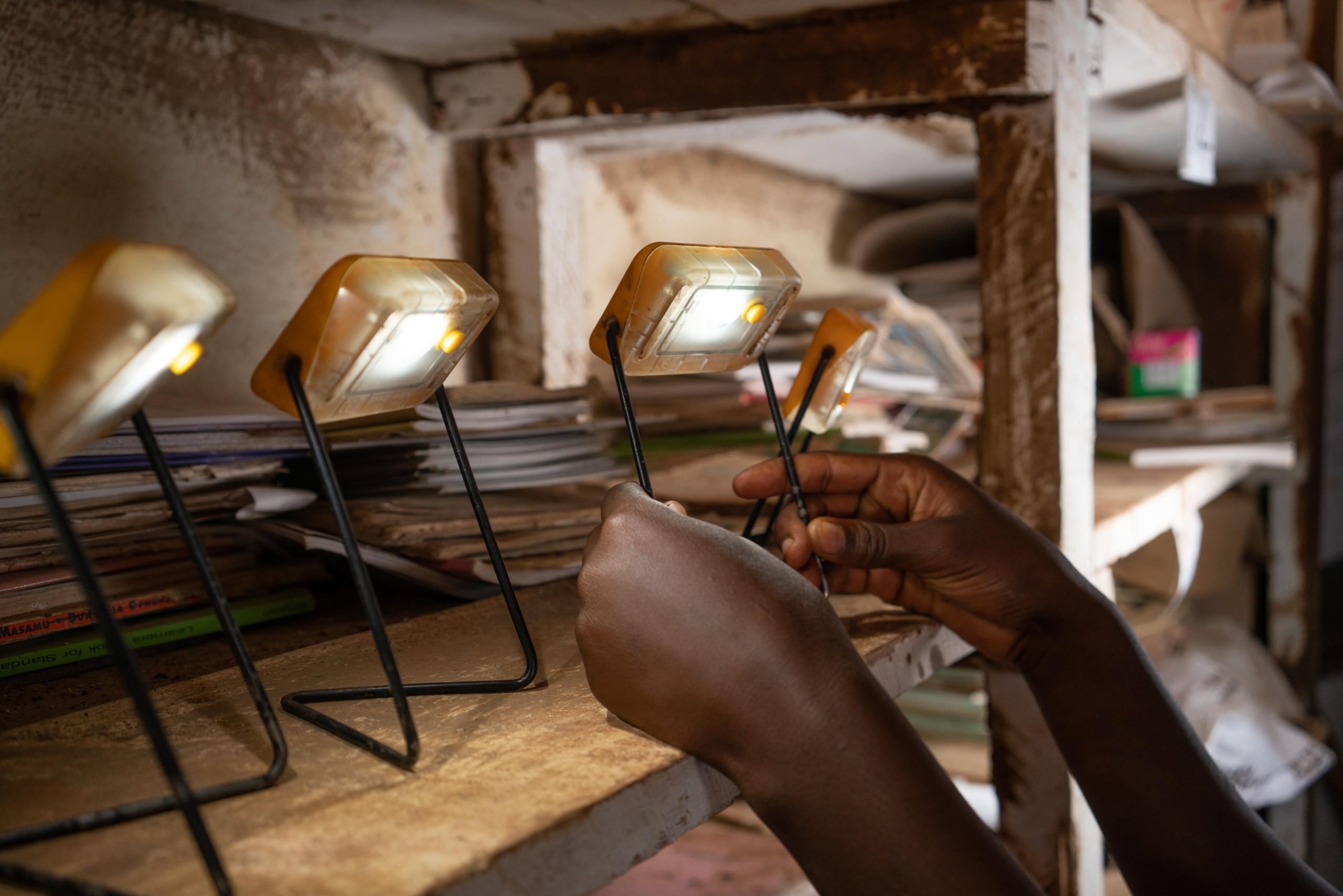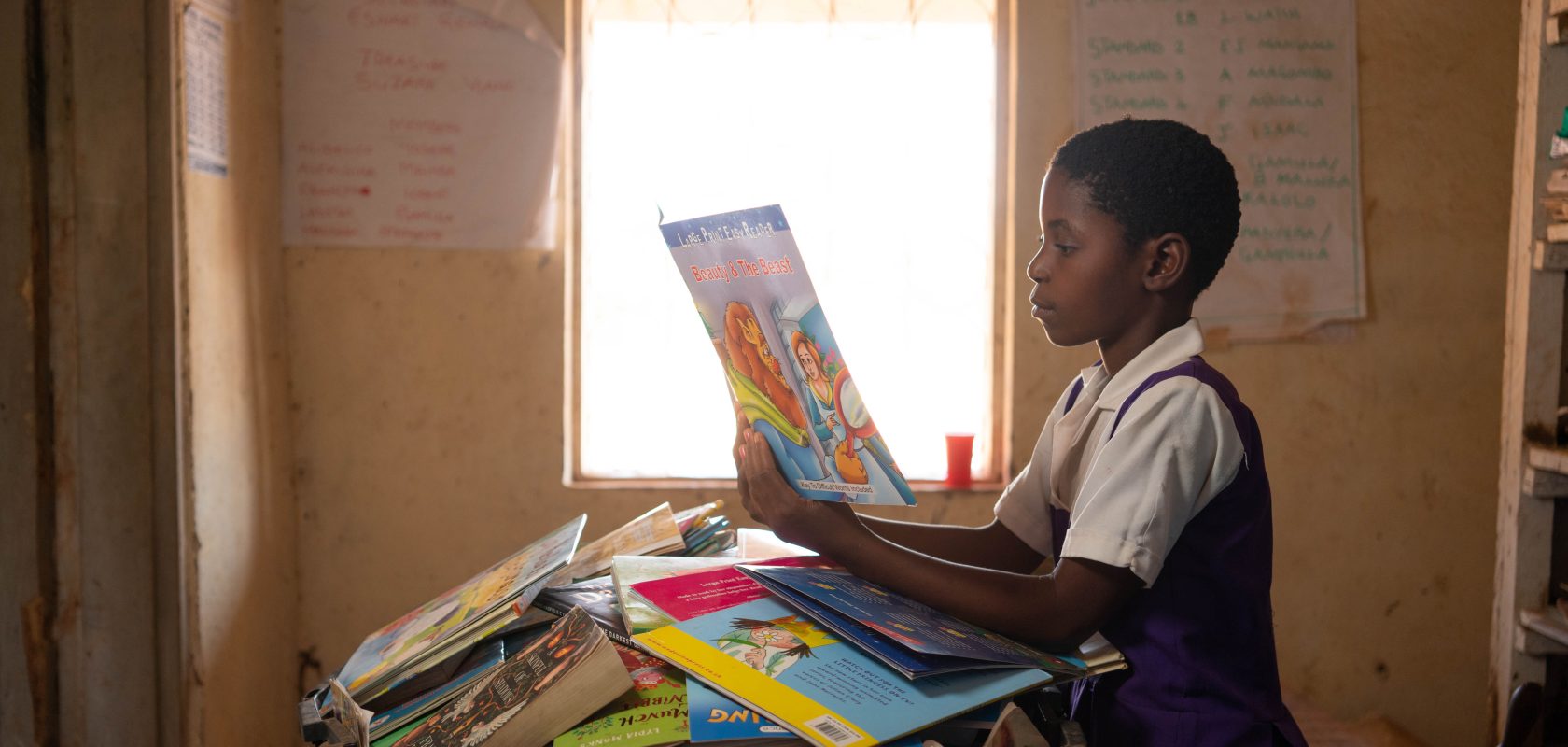A twenty minute drive down a dusty, bumpy road from the tarmac in Mankhamba, Central Malawi, sits Kachinda Moto. Surrounded by rolling hills, this small village is teeming with life. But, as the sun sets, a different story emerges. Like in most of sub-Saharan Africa, the evenings quickly turn to darkness. The darkness makes cooking, socialising and working a struggle. Doing homework becomes impossible. School children have little option but to use dangerous fire, toxic kerosene, or poor battery torches to study by, or to not study at all.

Kachinda Moto is not an exception – in Malawi, 96% of the rural population lack access to electricity (The World Bank, 2019). To combat this, in 2019, SolarAid launched Light Libraries. Light Libraries are like regular libraries for books, but for solar lights. It is a simple solution that allows school children to borrow a solar light, so they will be able to study after dark by safe, clean light.
However, if we are to fight poverty and climate change – we can’t do it alone. At SolarAid, we are big believers of the power of partnerships. That’s why, in 2021, we decided to team up with Book Aid International. Book Aid International works worldwide to supply schools and libraries which are lacking learning material with brand new books. Solar lights and books – a perfect fit!

Kalira Primary School. Photo: BookAidInternational/SolarAid/Chris Gagnon
Teleza Watson, 13, and Ensart Frank, 11, are both students at Kalira Primary School in Kachinda Moto. Kalira is one of the schools where children are now able to access both safe light and books to bring home in the evening. Both Teleza and Esnart dream of becoming teachers when they grow up so they like to study together.

Teleza Watson at Kalira Primary School dreams of becoming a teacher. Photo: BookAidInternational/SolarAid/Chris Gagnon
“I admire what teachers do. I admire teachers because they give us good lessons and I also want to give others a good future,” says Teleza who’s favourite subjects are Chichewa (Malawi’s national language) and English.
Teleza often borrows a solar light at the school Light Library so she will be able to read at night, “When I borrow a solar light and books I normally study at home (…) We also use solar lights when cooking in the kitchen and to make the bed.”
“I come to school to be educated. In order to pass the subject I study very hard”, says Esnart, whose favourite book is ‘Mada Apita Kusukulu’ (Mada goes to school). “I like it because it has different stories such as about school and reading.”

Esnart Frank, Kalira Primary School. Photo: BookAidInternational/SolarAid/Chris Gagnon
Both Esnart’s and Teleza’s families lack access to electricity. Though Teleza’s family were using a battery powered torch before they had access to solar, Esnar’s family had no light at home at all, so she couldn’t study during night time. The new Light Library now means that they can both study in the evening and their parents can use the light for household chores.
“Light Library means there are books and torches which school children should borrow and read. We use books to read and the solar light to read and make the bed,” says Esnart.

Esnart Frank visits the Light Library at Kalira Primary School. Photo: BookAidInternational/SolarAid/Chris Gagnon
Richard Story is a Light Librarian and teacher who also lives in Mankhamba, together with his wife and child. “I make sure that students have time to read. Now with the solar lights reading has developed into a culture for the children.”
He lights up when he talks about his job, “It feels so sweet, and I happily welcome the responsibility with both hands (…) I am noticing a positive change in examination performances (…) One of the reasons I chose this job is that I like reading. My teacher said he was surprised that I was always busy with books, but with no friends. It reached a point where some people nicknamed me a bookworm. Is it the same interest that sparked me to help other students with reading once I am done with my everyday work.”

Richard Story, teacher and Light Librarian. Photo: BookAidInternational/SolarAid/Chris Gagnon
In Malawi, the national poverty rate is 50.7% (The World Bank, 2021). SolarAid’s mission is for families to be able to own their own solar light one day, but recognising that many families struggle to buy a light of their own, Light Libraries aim to close that gap and reach even the poorest families with safe light. The solar lights do not only save families money they would otherwise have had to spend on candles or batteries, access to light and books is an investment in the future. It helps improve the quality of education which is a crucial step towards lifting families out of poverty.
“Some children dropout of school due to unexpected pregnancies and early marriages. Some quit school because they can’t look up to anyone in their village who is educated. We [also] have children who travel long distances.” However, things are changing in the area, “When a child is reading books, little by little, the content fills their mind.”

Richard Story teaching a class at Kalira Primary School. BookAidInternational/SolarAid/Chris Gagnon
“Mankhamba zone was not performing well in exams [before]. In 2019 we noticed the change. Almost 179 students were selected to good secondary schools out of 541 students who wrote exams. This year, we have 247 students who have passed the zonal exams. And we expect a good result for the 2021 exams. This is happening because of the light library project,” says Richard.
Richard knows the struggle that children in rural Malawi face. His own education was very difficult as he was living far away from the school, “Studying was also difficult because at the time, we had to use torches and candles. My school experience was complicated. It was hard to access books like the ones we have for kids with this project.”
The need to escape the darkness in areas like Mankhamba means that many families turn to open flames for light, it can be candles, often causing tragic accidents, or toxic kerosene lamps emitting dangerous smoke, creating indoor air pollution as well as polluting the environment. Some families use battery torches, but they are often poor quality and batteries are expensive.

Richard Story. Photo: BookAidInternational/SolarAid/Chris Gagnon
“Education and the Light Library project has also taught us to take care of nature. We stopped using batteries in our house and we are no longer experiencing fire accidents. I tell the surrounding neighbours about the benefits of SunnyMoney solar lamps. Nowadays we talk about climate change. We are no longer breathing hazardous air, because the solar lights use sunlight energy. The solar lights are also helping parents to save money. Now they are saving money and they can use it to take care of their families. ”
Richard is also being helped by solar in his own home, “As a teacher we normally make our lessons plans at night. The solar lights give us a chance to work day and night. When darkness falls we have something to depend on, and we can prepare for work.”
With access to solar light and books, the future is getting brighter. Teleza says, “School will give me good things in the future. Education will give me good things such as a teaching job to teach others. I will be able to teach and encourage them to read (…) If the library and books were no longer available I would feel pain because I would have nothing to read.”

Teleza Watson is reading Sherlock Holmes at Kalira School. Photo: BookAidInternational/SolarAid/Chris Gagnon
Thanks to all our fantastic supporters who are bringing clean, safe light to children who are living without access to electricity, like Teleza and Esnart, and to our partner, Book Aid International, for providing the books needed to offer children the opportunity to read and learn.
Everybody is needed to create change, learn more about how you can help us End the Darkness.
